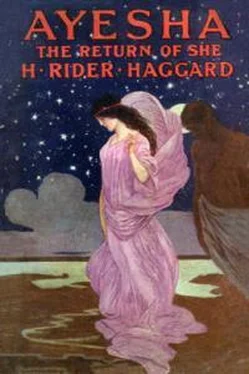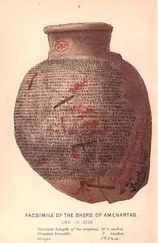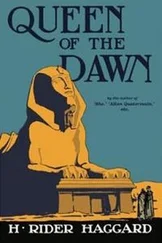I answered, well enough now that we were together again, and for the rest I would tell him later.
Then they brought us palanquins, carried, each of them, by two ponies, one of which was harnessed ahead and the other behind between long shaft–like poles. In these we seated ourselves, and at a sign from Simbri slaves took the leading ponies by the bridle and we started, leaving behind us that grim old Gate–house through which we were the first strangers to pass for many a generation.
For a mile or more our road ran down a winding, rocky gorge, till suddenly it took a turn, and the country of Kaloon lay stretched before us. At our feet was a river, probably the same with which we had made acquaintance in the gulf, where, fed by the mountain snows, it had its source. Here it flowed rapidly, but on the vast, alluvial lands beneath became a broad and gentle stream that wound its way through the limitless plains till it was lost in the blue of the distance.
To the north, however, this smooth, monotonous expanse was broken by that Mountain which had guided us from afar, the House of Fire. It was a great distance from us, more than a hundred miles, I should say, yet even so a most majestic sight in that clear air. Many leagues from the base of its peak the ground began to rise in brown and rugged hillocks, from which sprang the holy Mountain itself, a white and dazzling point that soared full twenty thousand feet into the heavens.
Yes, and there upon the nether lip of its crater stood the gigantic pillar, surmounted by a yet more gigantic loop of virgin rock, whereof the blackness stood out grimly against the blue of the sky beyond and the blinding snow beneath.
We gazed at it with awe, as well we might, this beacon of our hopes that for aught we knew might also prove their monument, feeling even then that yonder our fate would declare itself. I noted further that all those with us did it reverence by bowing their heads as they caught sight of the peak, and by laying the first finger of the right hand across the first finger of the left, a gesture, as we afterwards discovered, designed to avert its evil influence. Yes, even Simbri bowed, a yielding to inherited superstition of which I should scarcely have suspected him.
"Have you ever journeyed to that Mountain?" asked Leo of him.
Simbri shook his head and answered evasively.
"The people of the Plain do not set foot upon the Mountain. Among its slopes beyond the river which washes them, live hordes of brave and most savage men, with whom we are oftentimes at war; for when they are hungry they raid our cattle and our crops. Moreover, there, when the Mountain labours, run red streams of molten rock, and now and again hot ashes fall that slay the traveller."
"Do the ashes ever fall in your country?" asked Leo.
"They have been known to do so when the Spirit of the Mountain is angry, and that is why we fear her."
"Who is this Spirit?" said Leo eagerly.
"I do not know, lord," he answered with impatience. "Can men see a spirit?"
" You look as though you might, and had, not so long ago," replied Leo, fixing his gaze on the old man's waxen face and uneasy eyes. For now their horny calm was gone from the eyes of Simbri, which seemed as though they had beheld some sight that haunted him.
"You do me too much honour, lord," he replied; "my skill and vision do not reach so far. But see, here is the landing–stage, where boats await us, for the rest of our journey is by water."
These boats proved to be roomy and comfortable, having flat bows and sterns, since, although sometimes a sail was hoisted, they were designed for towing, not to be rowed with oars. Leo and I entered the largest of them, and to our joy were left alone except for the steersman.
Behind us was another boat, in which were attendants and slaves, and some men who looked like soldiers, for they carried bows and swords. Now the ponies were taken from the palanquins, that were packed away, and ropes of green hide, fastened to iron rings in the prows of the boats, were fixed to the towing tackle with which the animals had been reharnessed. Then we started, the ponies, two arranged tandem fashion to each punt, trotting along a well–made towing path that was furnished with wooden bridges wherever canals or tributary streams entered the main river.
"Thank Heaven," said Leo, "we are together again at last! Do you remember, Horace, that when we entered the land of Kor it was thus, in a boat? The tale repeats itself."
"I can quite believe it," I answered. "I can believe anything. Leo, I say that we are but gnats meshed in a web, and yonder Khania is the spider and Simbri the Shaman guards the net. But tell me all you remember of what has happened to you, and be quick, for I do not know how long they may leave us alone."
"Well," he said, "of course I remember our arrival at that Gate after the lady and the old man had pulled us out of the river, and, Horace, talking of spiders reminds me of hanging at the end of that string of yak's hide. Not that I need much reminding, for I am not likely to forget it. Do you know I cut the rope because I felt that I was going mad, and wished to die sane. What happened to you? Did you slip?"
"No; I jumped after you. It seemed best to end together, so that we might begin again together."
"Brave old Horace!" he said affectionately, the tears starting to his grey eyes.
"Well, never mind all that," I broke in; "you see you were right when you said that we should get through, and we have. Now for your tale."
"It is interesting, but not very long," he answered, colouring. "I went to sleep, and when I woke it was to find a beautiful woman leaning over me, and Horace—at first I thought that it was—you know who, and that she kissed me; but perhaps it was all a dream."
"It was no dream," I answered. "I saw it."
"I am sorry to hear it—very sorry. At any rate there was the beautiful woman—the Khania—for I saw her plenty of times afterwards, and talked to her in my best modern Greek—by the way, Ayesha knew the old Greek; that's curious."
"She knew several of the ancient tongues, and so did other people. Go on."
"Well, she nursed me very kindly, but, so far as I know, until last night there was nothing more affectionate, and I had sense enough to refuse to talk about our somewhat eventful past. I pretended not to understand, said that we were explorers, etc., and kept asking her where you were, for I forgot to say I found that you had gone. I think that she grew rather angry with me, for she wanted to know something, and, as you can guess, I wanted to know a good deal. But I could get nothing out of her except that she was the Khania—a person in authority. There was no doubt about that, for when one of those slaves or servants came in and interrupted her while she was trying to draw the facts out of me, she called to some of her people to throw him out of the window, and he only saved himself by going down the stairs very quickly.
"Well, I could make nothing of her, and she could make little of me, though why she should be so tenderly interested in a stranger, I don't know—unless, unless—oh! who is she, Horace?"
"If you will go on I will tell you what I think presently. One tale at a time."
"Very good. I got quite well and strong, comparatively speaking, till the climax last night, which upset me again. After that old prophet, Simbri, had brought me my supper, just as I was thinking of going to sleep, the Khania came in alone, dressed like a queen. I can tell you she looked really royal, like a princess in a fairy book, with a crown on, and her chestnut black hair flowing round her.
"Well, Horace, then she began to make love to me in a refined sort of way, or so I thought, looked at me and sighed, saying that we had known each other in the past—very well indeed I gathered—and implying that she wished to continue our friendship. I fenced with her as best I could; but a man feels fairly helpless lying on his back with a very handsome and very imperial–looking lady standing over him and paying him compliments.
Читать дальше
Конец ознакомительного отрывка
Купить книгу












